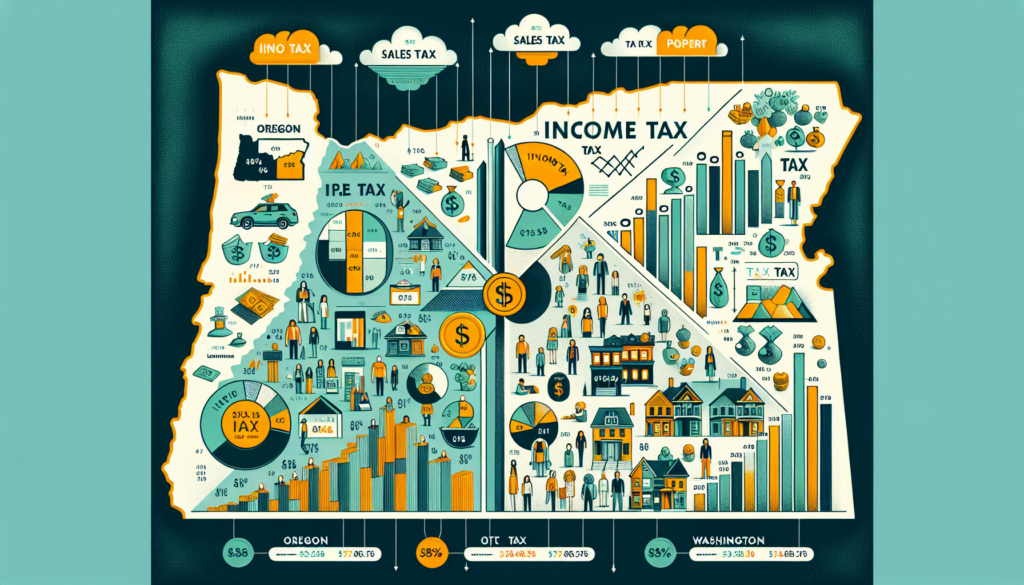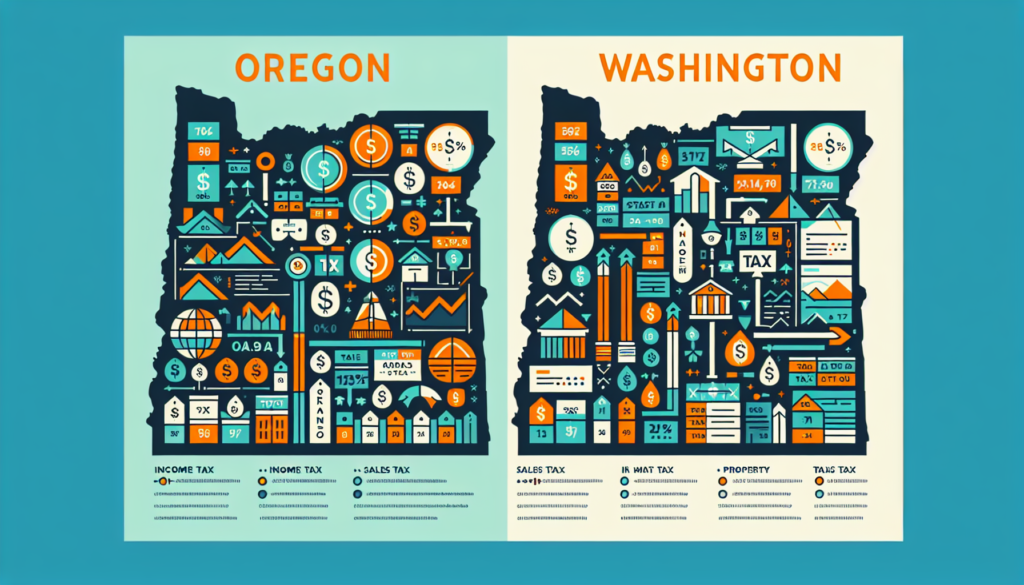
Tax Comparison: Oregon and Washington
Are you curious about the tax situation in Oregon and Washington? Well, look no further! In this article, we will explore the tax comparison between these two neighboring states. You may be wondering, who pays more taxes? Join us as we delve into the details and compare the tax systems of Oregon and Washington. Get ready to uncover the differences and similarities in tax rates, income tax, property tax, and more. Whether you’re a resident of Oregon or Washington or simply interested in understanding how taxes vary across states, this article has got you covered. So, let’s get started!
Table of Contents
ToggleTax Structure in Oregon
Overview of Oregon’s tax system
Oregon’s tax system is characterized by several key components: state income tax, property tax, sales and use tax, estate tax, and other taxes. These taxes collectively contribute to funding various public services and infrastructure in the state. Understanding Oregon’s tax structure is crucial for both residents and businesses to navigate their tax obligations effectively.
State income tax
Oregon implements a progressive income tax system, which means that higher-income individuals pay a higher tax rate compared to those with lower incomes. The state has multiple tax brackets, ranging from 4.75% to 9.9%, with higher rates applicable to higher income levels. This progressive income tax structure is designed to promote a more equitable distribution of the tax burden among taxpayers.
Sales and use tax
Notably, Oregon is one of the few states in the United States that does not impose a statewide sales and use tax. Consequently, when you make purchases in Oregon, you are not required to pay any additional sales tax on top of the purchase price. This absence of a sales tax has its implications for both consumers and businesses operating in the state.
Property tax
Property tax is another significant component of Oregon’s tax structure. It is a tax levied annually on the value of real property, including land, buildings, and any improvements made to the property. Oregon’s property tax rates vary by county and are relatively lower compared to some other states. However, the total property tax amount can still vary greatly depending on factors such as property value, location, and local tax rates.
Estate tax
Oregon imposes an estate tax on the transfer of assets upon an individual’s death. This tax applies to estates with a total value exceeding a certain threshold. Oregon’s estate tax rates range from 10% to 16%, with the threshold varying based on the year of death. It is essential for individuals with significant assets to consider estate planning strategies to minimize potential estate tax liabilities.
Other taxes
Apart from the mentioned taxes, Oregon also levies various other taxes and fees. For instance, there are motor vehicle taxes and fees imposed on vehicle registrations and fuel purchases. Businesses operating in Oregon are subject to different taxes and fees, such as corporate income tax, employer payroll taxes, and the Oregon Minimum Tax. It is crucial for businesses to understand and comply with these obligations to ensure a smooth operation.
Tax Structure in Washington
Overview of Washington’s tax system
Washington’s tax system differs significantly from Oregon’s. Unlike Oregon, Washington does not impose a state income tax on individuals. This absence of a state income tax is one of the defining features of Washington’s tax structure. However, it is important to note that Washington still collects taxes through other means, such as sales and use tax, property tax, estate tax, and various other taxes.
Sales and use tax
In contrast to Oregon, Washington implements a retail sales tax at the state level. When you make purchases in Washington, a sales tax is added to the purchase price, typically ranging from 6.5% to 10%, depending on the location. The exact rate varies by county and city, as some local jurisdictions can add additional sales taxes. This sales tax revenue plays a crucial role in funding various public services and projects within the state.
Property tax
Similar to Oregon, Washington also levies a property tax on real property. However, the property tax structure in Washington differs in several ways. Washington’s property tax rates also vary by county like Oregon, but they tend to be higher on average. Additionally, Washington uses a system called “levy lid” to limit annual growth in property tax revenue. This mechanism ensures that property tax increases are capped, preventing sharp spikes in tax burdens for property owners.
Estate tax
Washington imposes an estate tax on certain estates with a total value exceeding a specific threshold. The estate tax rates in Washington range from 10% to 20%, depending on the estate’s value. Notably, Washington has one of the highest estate tax rates in the country. However, it is worth mentioning that the threshold for this tax is relatively high, and most estates do not reach the threshold for taxation.
Other taxes
Similar to Oregon, Washington also has additional taxes and fees. These include motor vehicle excise taxes, business and occupation taxes, property taxes on businesses, and several others. Understanding these various tax obligations is crucial for both individuals and businesses operating in Washington.

Comparison of Income Taxes
Oregon’s progressive income tax
Oregon’s implementation of a progressive income tax system means that higher earners pay a higher percentage of their income in taxes. This progressive structure aims to promote income equality by redistributing the tax burden accordingly. However, it can potentially place a heavier burden on individuals with higher incomes.
Washington’s lack of state income tax
In contrast to Oregon, Washington does not impose a state income tax on individuals. This can be seen as a benefit for individuals with higher incomes, as they do not have to pay state income tax on their earnings. However, this lack of a state income tax means that Washington must generate revenue from other sources, such as sales and property taxes.
Impact on residents and businesses
The differences in income tax structures between Oregon and Washington have notable implications for residents and businesses. Oregon’s progressive income tax can be advantageous for individuals with lower incomes, as they are subject to lower tax rates. However, higher-income individuals may find themselves facing a relatively higher tax burden in Oregon. On the other hand, Washington’s lack of a state income tax can attract higher-income individuals and businesses seeking to minimize their tax liabilities. This difference can have an impact on where people choose to live, work, and establish their businesses.
Sales and Use Taxes
Oregon’s lack of sales tax
One of the notable features of Oregon’s tax system is its absence of a statewide sales tax. When you make purchases in Oregon, you only pay the listed price without any additional sales tax. This can be seen as a benefit for consumers, as it allows them to save money on purchases.
Washington’s retail sales tax
In contrast, Washington imposes a retail sales tax on most goods and services. When you make purchases in Washington, a sales tax is added to the purchase price. This sales tax revenue plays a significant role in funding various public services and projects within the state.
Differences in consumer behavior and business competitiveness
The presence of a sales tax in Washington can influence consumer behavior and business competitiveness in the region. Oregon’s lack of a sales tax may incentivize consumers from neighboring states, including Washington, to make purchases in Oregon to avoid paying additional taxes. This can impact businesses located near state borders, as they may experience increased sales from out-of-state consumers seeking tax savings. However, it is worth noting that businesses in Washington may face higher overall operational costs due to the sales tax obligations.

Property Taxes
Overview of property taxes in both states
Both Oregon and Washington levy property taxes on real property, including land and buildings. Property taxes are a significant source of revenue for local governments and play a vital role in financing public services and infrastructure projects.
Oregon’s property tax system
In Oregon, property tax rates vary by county and are generally lower compared to some other states. Property values, location, and local tax rates are factors that influence the total property tax amount an individual or business may pay. Oregon’s property tax system ensures that property assessments are done periodically to reflect changes in property values accurately.
Washington’s property tax system
Washington’s property tax system also varies by county, but on average, the property tax rates tend to be higher compared to Oregon. Washington uses a levy lid mechanism to regulate property tax growth, limiting annual increases. This helps provide stability to property owners by preventing sudden spikes in property tax burdens.
Comparison of property tax rates and assessments
When comparing property taxes between Oregon and Washington, it is essential to consider varying factors such as property values, local tax rates, and individual circumstances. On average, Oregon tends to have lower property tax rates, but there can be significant variations within the state. Washington’s property tax rates are generally higher, but the levy lid mechanism provides a degree of predictability for property owners.
Estate Taxes
Oregon’s estate tax
Oregon imposes an estate tax on the transfer of assets upon an individual’s death. The estate tax rates in Oregon range from 10% to 16%, depending on the total value of the estate. The threshold for taxation varies based on the year of death. Proper estate planning strategies can help minimize potential estate tax liabilities for individuals and their beneficiaries in Oregon.
Washington’s estate tax
Similar to Oregon, Washington also levies an estate tax on certain estates with a total value exceeding a specific threshold. The estate tax rates in Washington range from 10% to 20%, making it one of the highest rates among states with an estate tax. However, it is worth noting that most estates do not reach the threshold for taxation, and careful estate planning can help mitigate potential tax burdens.
Differences in thresholds and rates
Although both Oregon and Washington impose estate taxes, there are differences in the thresholds and rates applied. Washington has a higher maximum tax rate, but the threshold for taxation is relatively high compared to other states. On the other hand, Oregon has a lower maximum tax rate, but the threshold can potentially impact a broader range of estates. Individuals with significant assets should consult professionals to ensure effective estate planning to minimize estate tax liabilities.
Other Taxes and Fees
Motor vehicle taxes and fees
Both Oregon and Washington impose taxes and fees related to motor vehicles. These include vehicle registration fees, fuel taxes, and additional charges depending on the vehicle’s size, weight, and type. Understanding these tax obligations is essential for vehicle owners in both states.
Business taxes and fees
Businesses operating in Oregon and Washington are subject to various taxes and fees. This includes corporate income tax, employer payroll taxes, business and occupation taxes, and other levies specific to certain industries. Businesses should be familiar with the tax requirements and potential deductions to effectively manage their tax obligations.
Comparison of other tax burdens
When comparing other taxes and fees, it is important to consider the specific circumstances of individuals and businesses. Oregon and Washington have different tax rates and requirements, and the impact can vary based on factors such as income level, business type, industry, and location. Consulting with tax professionals can help navigate these complex tax landscapes effectively.
Taxpayer Benefits and Drawbacks
Oregon’s tax advantages
One of the notable tax advantages of Oregon is its lack of a statewide sales tax. This benefits consumers, as they can save money while making purchases. Additionally, Oregon’s progressive income tax system can be advantageous for individuals with lower incomes, as they are subject to lower tax rates.
Washington’s tax advantages
Washington’s lack of a state income tax is a significant advantage for individuals with higher incomes. They can avoid paying state income tax, potentially resulting in tax savings. However, it is important to keep in mind that the absence of a state income tax means that Washington must generate revenue from other sources, such as sales and property taxes.
Considerations for residents and businesses
When choosing between Oregon and Washington, individuals and businesses should consider their specific circumstances, income levels, and priorities. Oregon’s tax advantages, such as the lack of a statewide sales tax, may appeal to consumers and businesses seeking to maximize their purchasing power. On the other hand, Washington’s lack of a state income tax can attract higher-income individuals and businesses aiming to minimize their income tax obligations. Careful consideration of these factors is crucial in determining the overall tax burden and financial implications.
Economic Impact
Economic implications of tax differences
The tax differences between Oregon and Washington have significant economic implications. These differences can influence the decisions of individuals and businesses on where to live, work, and establish their operations. Tax policies and burdens can impact spending power, relocation decisions, and overall economic growth within these states.
Effects on job growth and business relocation
The absence of a state income tax in Washington can attract individuals and businesses, particularly those with higher incomes. This can potentially result in job growth and increased economic activity in the state. On the other hand, Oregon’s progressive income tax may be more appealing to individuals with lower incomes, as it offers a lower tax rate. These factors can influence business decisions on where to establish operations and create employment opportunities.
Incentives and drawbacks for businesses
For businesses, the tax structures in Oregon and Washington present various incentives and drawbacks. Oregon’s lack of a sales tax can be advantageous for businesses by attracting consumers from neighboring states and encouraging local spending. However, businesses in Oregon may face higher income tax obligations, depending on their profitability. In contrast, Washington’s lack of a state income tax can be appealing to businesses aiming to minimize their tax liabilities. However, these businesses may face higher overall operational costs due to sales and property tax obligations.
Conclusion
Summary of tax comparison
In summary, Oregon and Washington have notably different tax structures. Oregon implements a progressive income tax system, lacks a sales tax, and has a relatively lower property tax rate. Washington, on the other hand, does not impose a state income tax, implements a sales tax, and tends to have higher property tax rates. Both states have estate taxes and various other taxes and fees that individuals and businesses must be aware of.
Factors to consider when assessing tax burden
When assessing the overall tax burden, individuals and businesses should consider factors such as income levels, purchasing power, property values, and specific obligations within each state. The presence or absence of certain taxes can impact personal and business finances significantly.
Personal preferences and priorities
Ultimately, the choice between Oregon and Washington depends on personal preferences, financial circumstances, and priorities. Some individuals and businesses may prioritize tax savings, while others may focus on specific amenities, job opportunities, or quality of life. Consulting with tax professionals and considering individual situations can help make informed decisions regarding tax obligations and overall financial well-being.
You May Also Like

Fort Vancouver National Historical Site
2 September 2023
Is Vancouver WA a Better Place to Live than Portland?
11 January 2024





